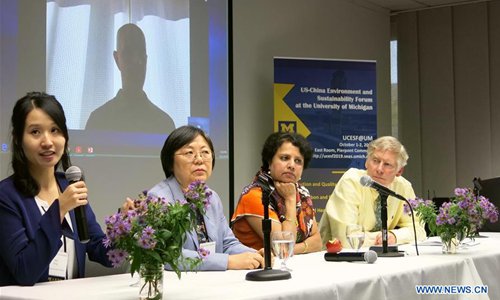HOME >> CHINA
Academic slams Belgium for rejecting visa over espionage claim
By Zhang Han and Zhang Hui Source:Global Times Published: 2019/10/31 23:08:40

Scholars from China and the United States attend a panel discussion at US-China Environment and Sustainability Forum in Ann Arbor of Michigan, the United States, on Oct. 2, 2019. About 150 scholars from China and the United States gathered at the University of Michigan (UM) in the U.S. Midwest state of Michigan to seek sustained environmental development. Photo: Xinhua
A Chinese academic denied an espionage accusation by the Belgian government in an interview with the Global Times, saying he had filed a lawsuit after the authorities banned him from entering the Schengen area for eight years.
Song Xinning, a professor at the School of International Studies of Renmin University of China in Beijing, received the travel ban in September from the Belgian government when applying for a Schengen visa for an academic tour of three European universities, including Belgium's Vrije Universiteit Brussel (VUB).
The visa is for the Schengen area, which covers 26 European countries that have abolished passport and other controls at their mutual borders. Before the ban was issued, Austria approved Song's visa, which is a stop on his tour.
Song served as the head of the Confucius Institute at the VUB until July.
"They [Belgian Intelligence agency] claimed in May that I worked with Chinese intelligence services which damaged the country's national security," Song told the Global Times.
"I completely deny the accusation by the Belgian government and have asked a local lawyer to appeal," said Song, noting that relevant documents have been submitted to a Belgian court.
Song also noted that he suspects a US envoy is behind this. The envoy had asked Song to "cooperate" at a lunch event.
"He first said that I was working with Chinese intelligence, and I denied it. He then asked me to cooperate and I refused," Song said.
"He said if I work with them, they'll support me and there will be no issue if I want to go to Europe. Otherwise, the consequences would be very serious," Song recalled.
Song said he had met the envoy at several events at the VUB Confucius Institute and occasions, including luncheons and coffee breaks.
Song's response came after the travel denial was hyped by Western media as espionage.
"Media reports not only targeted me, but were also meant to tarnish the Confucius Institute," he said. The institute at VUB focuses on studies on contemporary China and has held more than 50 academic symposiums in the past three years, with some 200 Chinese scholars invited and 6,000 Europeans participating.
Geng Shuang, a spokesperson of the Chinese Foreign Ministry, called reports accusing Song of "espionage" false and have ulterior motives at a routine press conference on Thursday.
"We firmly oppose such behavior that obstructs normal exchanges and education cooperation projects," Geng said.
Song is an expert on European studies and was awarded the Jean Monnet Chair in 2010 by the European Commission in 2010, Geng said.
Song was sent by Renmin University of China to serve as the director of the VUB Confucius Institute in April 2016, and returned to China on July 31 after his term ended.
Posted in: POLITICS